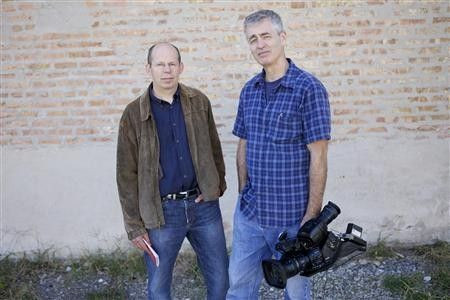"Interrupters" film looks at stopping city violence

A woman in a headscarf runs into the street to calm a crowd before violence erupts. "This is what a war zone looks like," a voiceover declares.
But the "war zone" in the new documentary movie "The Interrupters" isn't Iraq or Afghanistan. It is Chicago's South Side, where some neighborhoods are stricken with violence.
The documentary, which opened late last month in New York, follows three former criminals -- Cobe, Eddie, and Ameena -- as they use their status as community insiders to "interrupt" conflicts before blood is shed. They are all part of CeaseFire, a Chicago-based anti-violence organization.
For co-producers Steve James and Alex Kotlowitz, the perils of life in inner city Chicago are not new terrain. James, who also directed the film, found himself revisiting "the same worlds" of his award-winning 1994 documentary, "Hoop Dreams."
Likewise, 20 years after Kotlowitz wrote his bestseller "There Are No Children Here," which told of two brothers growing up in Chicago's government-subsidized housing, the journalist didn't find much change, either.
"Since the book came out, I've lost four kids who I knew -- all of them were murdered," he told Reuters. "Two others who I knew are serving time for murder. It's troubled me, unsettled me, perplexed me."
The new documentary shows the grim consequences of the violence that CeaseFire's interrupters try to prevent.
One mother with sons in rival gangs approaches CeaseFire to help reach out to her sons. Eddie, one of the interrupters who served 14 years in prison for a murder he committed as a teenager, mentors a young girl whose brother died in her arms.
"I think there's this glib notion that people in this community have gotten numb to the violence," said Kotlowitz.
"Nothing could be further from the truth," added James. "When families lost loved ones, the pain of that loss was so palpable that these people were far from numb."
Despite the often gloomy subject matter, the interrupters enjoy a fair share of triumph in quelling volatile situations on Chicago's streets, which the filmmakers found inspiring.
"We were really happy at the amount of success we captured, because it's important to see the change people are capable of making," James said. "People don't want to give up."
TAKING IT TO THE STREETS
James and Kotlowitz decided to collaborate on "The Interrupters" after Kotlowitz wrote a story for the New York Times in 2008 about CeaseFire. The friends were excited to begin their first project together but faced a few challenges.
They weren't sure if they would be able to film the interrupters while they mediated confrontations in the streets. They solved this problem by using a very small crew and by building relationships with the interrupters they filmed.
"A challenge was winning the trust and confidence of our main subjects so that they really opened up to us -- in this case, not only about their lives, but also feeling okay to take us with them into the streets," James said.
Another issue James and Kotlowitz faced was weaving a cohesive story from over 300 hours of film footage because so much of their work was shooting actual events. The challenge was linking those events into a cohesive story.
"There's nothing more enticing than a strong narrative to pull somebody through a film, and we didn't have that," James said. "We knew it would be more episodic -- and I actually like that idea."
The results seem to be working. "The Interrupters" has been featured at several major film festivals including Sundance, and has garnered several awards. It has a 100 percent positive rating on review website Rottentomatoes.com.
James and Kotlowitz said that, for them, the most exciting reaction has been watching how people connect with their film.
"We had a special premiere in Chicago for all the people in the film about a mile from the neighborhood where we did most of our filmmaking," Kotlowitz said. "It was exhilarating."
"I think one thing stories can do, especially in this case, is make you feel less alone and give some affirmation to your experiences and feelings," he added.
© Copyright Thomson Reuters 2024. All rights reserved.





















